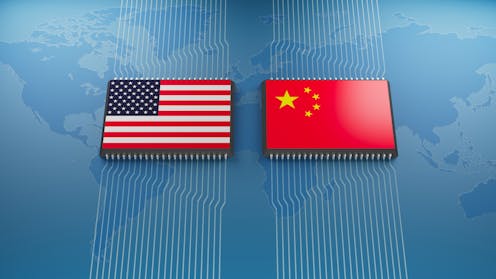Blocking exports and raising tariffs is a bad defense against industrial cyber espionage, study shows
- Written by William Akoto, Assistant Professor of Global Security, American University

The United States is trying to decouple its economy from rivals like China. Efforts toward this include policymakers raising tariffs[1] on Chinese goods, blocking exports[2] of advanced technology and offering subsidies[3] to boost American manufacturing. The goal is to reduce reliance on China for critical products in hopes that this will also protect U.S. intellectual property from theft.
The idea that decoupling will help stem state-sponsored cyber-economic espionage has become a key justification for these measures. For instance, then-U.S. Trade Representative Katherine Tai framed the continuation of China-specific tariffs as serving[4] the “statutory goal to stop [China’s] harmful … cyber intrusions and cyber theft.” Early tariff rounds[5] during the first Trump administration were likewise framed as forcing Beijing to confront “deeply entrenched” theft of U.S. intellectual property.
This push to “onshore” key industries is driven by very real concerns. By some estimates, theft of U.S. trade secrets, often through hacking – costs the American economy hundreds of billions[6] of dollars per year. In that light, decoupling is a defensive economic shield – a way to keep vital technology out of an adversary’s reach.
But will decoupling and cutting trade ties truly make America’s innovations safer from prying eyes? I’m a political scientist[7] who studies state-sponsored cyber espionage[8], and my research[9] suggests that the answer is a definitive no. Indeed, it might actually have the opposite effect.
To understand why, it helps to look at what really drives state-sponsored hacking.
Rivalry, not reliance
Intuitively, you might think a country is most tempted to steal secrets from a nation it depends on. For example, if Country A must import jet engines or microchips from Country B, Country A might try to hack Country B’s companies to copy that technology and become self-sufficient. This is the industrial dependence[10] theory of cyber theft.
There is some truth to this motive. If your economy needs what another country produces, stealing that know-how can boost your own industries and reduce reliance. However, in a recent study[11], I show that a more powerful predictor of cyber espionage is industrial similarity. Countries with overlapping advanced industries such as aerospace, electronics or pharmaceuticals are the ones most likely to target each other with cyberattacks.
Why would having similar industries spur more spying? The reason is competition. If two nations both specialize in cutting-edge sectors, each has a lot to gain by stealing the other’s innovations.
If you’re a tech powerhouse, you have valuable secrets worth stealing, and you have the capability and motivation to steal others’ secrets. In essence, simply trading with a rival isn’t the core issue. Rather, it’s the underlying technological rivalry that fuels espionage.
For example, a cyberattack in 2012 targeted SolarWorld[12], a U.S. solar panel manufacturer, and the perpetrators stole the company’s trade secrets. Chinese solar companies then developed competing products based on the stolen designs, costing SolarWorld millions in lost revenue. This is a classic example of industrial similarity at work. China was building its own solar industry, so it hacked a U.S. rival to leapfrog in technology.
China has made major investments in its cyber-espionage capabilities.Boosting trade barriers can fan the flames
Crucially, cutting trade ties doesn’t remove this rivalry. If anything, decoupling might intensify it. When the U.S. and China exchange tariff blows or cut off tech transfers, it doesn’t make China give up – it likely pushes Chinese intelligence agencies to work even harder to steal what they can’t buy.
This dynamic isn’t unique to China. Any country that suddenly loses access to an important technology may turn to espionage as Plan B.
History provides examples. When South Africa was isolated by sanctions in the 1980s, it covertly obtained[13] nuclear weapons technology. Similarly, when Israel faced arms embargoes in the 1960s, it engaged in clandestine efforts[14] to get military technology. Isolation can breed desperation, and hacking is a low-cost, high-reward tool for the desperate.
If decoupling won’t end cyber espionage, what will?
There’s no easy fix for state-sponsored hacking as long as countries remain locked in high-tech competition. However, there are steps that can mitigate the damage and perhaps dial down the frequency of these attacks.
One is investing in cyber defense. Just as a homeowner adds locks and alarms after a burglary, companies and governments should continually strengthen their cyber defenses. Assuming that espionage attempts are likely to happen is key. Advanced network monitoring, employee training against phishing, and robust encryption can make it much harder for hackers to succeed, even if they keep trying.
Another is building resilience and redundancy. If you know that some secrets might get stolen, plan for it. Businesses can shorten product development cycles and innovate faster so that even if a rival copies today’s tech, you’re already moving on to the next generation. Staying ahead of thieves is a form of defense, too.
Ultimately, rather than viewing tariffs and export bans as silver bullets against espionage, U.S. leaders and industry might be safer focusing on resilience[15] and stress-testing[16] cybersecurity firms. Make it harder for adversaries to steal secrets, and less rewarding even if they do.
References
- ^ raising tariffs (www.pbs.org)
- ^ blocking exports (www.reuters.com)
- ^ subsidies (www.sba.gov)
- ^ tariffs as serving (ustr.gov)
- ^ tariff rounds (www.reuters.com)
- ^ hundreds of billions (www.cbsnews.com)
- ^ political scientist (willakoto.com)
- ^ studies state-sponsored cyber espionage (scholar.google.com)
- ^ my research (doi.org)
- ^ industrial dependence (doi.org)
- ^ in a recent study (doi.org)
- ^ targeted SolarWorld (pv-magazine-usa.com)
- ^ covertly obtained (isis-online.org)
- ^ clandestine efforts (ciaotest.cc.columbia.edu)
- ^ focusing on resilience (theconversation.com)
- ^ stress-testing (doi.org)







